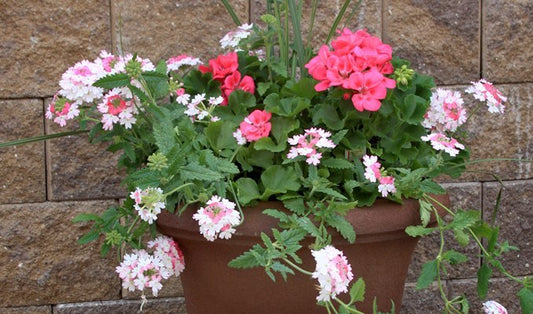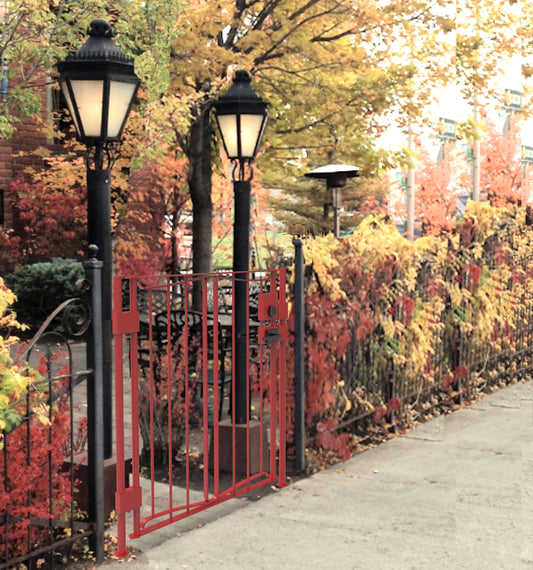Container gardening opens up the possibility of gardening to many homeowners who may not garden otherwise while adding a beautiful touch of greenery and color to outdoor spaces. Adding mosquito-repelling plants to your container garden offers a natural way to ward off pesky, problematic bugs protecting both you and your other garden plants.
What is Container Gardening?
To put it simply, container gardening is growing plants - whether ornamental or edible - exclusively in containers versus planting them in the ground. Over the last decade or so container gardening has gained immense popularity since it offers people living in apartments, townhouses, or rental properties the ability to grow a garden. Container gardening allows just about anyone the chance to grow plants since it doesn’t require a yard, only the space to put containers.
Container gardens are often incorporated into outdoor living spaces, contributing to the ambiance and outdoor decor, complimenting the areas where people gather. Adding mosquito-repelling plants to the collection improves the space by providing a natural way to reduce and ward off annoying pests.
Benefits of Using Plants to Repel Insects
As the incidence of West Nile virus rises, as well as other mosquito-borne illnesses, homeowners are looking for simple ways to keep mosquitoes out of their yard and away from their family and friends. Growing plants that naturally repel insects offers an effective solution to a growing concern for a couple of different reasons.
Using plants to repel insects cuts down on the cost and labor involved with spraying chemicals around the home and lawn. It also drastically reduces, if not completely eradicates, exposure to chemicals whether organic or conventional pesticides.
Adding mosquito-repelling plants to your container garden also takes some of the work out of insect control in your yard. You don’t have to remember to spray before parties or backyard barbecues, and there isn’t a need to douse your children in bug spray or light citronella candles every time they want to go outside and play. The plants do their bug-repelling, all of the time with little effort on their part.
Why Do Some Plants Repel Mosquitoes?
Essential oils found within plant tissues act as a natural, biological pesticide, repelling insects. Tiny globules containing these oils form on the leaves and stems of the plants; high temperatures or prolonged direct sunlight cause the globules to become volatile, evaporating the oils into vapors that are released into the air, keeping insects at bay.
Garden Plants that are Known for Repelling Mosquitoes
There are quite a few garden plants known for repelling mosquitoes and other insects. These are some of the most common.
1. Lavender is unique in that its signature scent is absolutely repulsive to moths, flies, and mosquitoes. With flowers ranging from deep violet to white, lavender the shrub-like plants also create informal hedges adding privacy to your outdoor space.
2. Marigolds are known for their compact, yellow and orange blooms and a distinct scent that deters mosquitoes and aphids. These annual plants prefer full sun locations and do very well in heat. Marigolds bloom all summer long, providing cheery color and long-lasting insect control for you and their neighboring vegetable plants.
3. Catnip pulls double duty as a mosquito repellent and a fun treat for your furry feline companions. A member of the mint family, catnip also has a tendency to take over a garden if left to its own devices so growing it in containers is a great way to keep it controlled.
4. Citronella grass contains oil that repels mosquitoes and its strong lemony scent deters white-flies and other pests. While the plant doesn’t release its oils naturally as it grows, the grass blades can be crushed and then rubbed directly on your skin or clothing for protection.
5. Basil is one of the most popular and widely used culinary herbs and is found in many herb gardens for its use in the kitchen. Many people are unaware though that it contains an oil that kills mosquito eggs thus making it a fantastic, natural insect deterrent.
6. Rosemary is a common herb, known for its distinctive scent that is derived from the oils found within the plant. Like many of the other plants, this highly favored oil is unpleasant to many insects, mosquitoes included. Both the plant, and stem cuttings are an effective repellent.
Tips for a Mosquito-repelling Container Garden
To enjoy a successful mosquito-repelling container garden, heed the following tips.
- Place mosquito-repelling plants along the perimeter of the container garden, close to the outdoor living areas you frequent.
- Make sure containers are filled with high-quality potting soil to promote optimum plant growth. Healthy plants deter insects more effectively.
- Add mosquito-repelling plants to planter boxes on your deck using deck railing planter brackets to keep your dining area free of mosquitoes.
- When growing large plants such as citronella grass or lavender, put containers on heavy-duty rolling plant caddies to easily move containers around depending on the occasion and where you need a mosquito free zone.
- Some mosquito-repelling plants can be boiled and used to create simple repellent sprays.
- Avoid having any free standing water in the garden, bird baths included. Mosquitoes lay their eggs in stagnant water.
Conclusion
Adding mosquito-repelling plants to your container garden is an effective way to cut down on the need for chemical pesticides. These plants deter insects through their strong scent, or naturally-occurring oils creating an environment with reduced mosquitoes, providing a simple solution to insect control.





